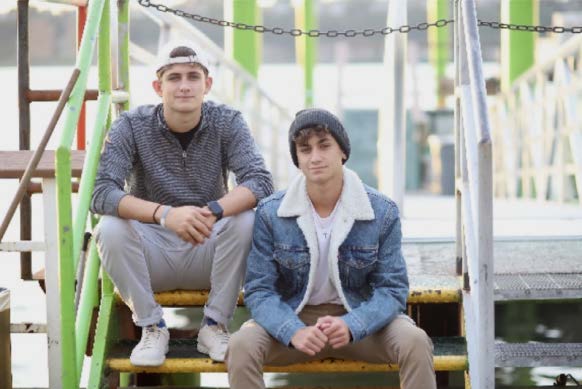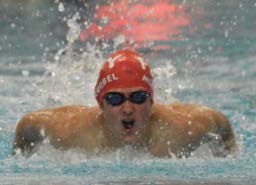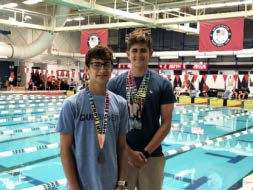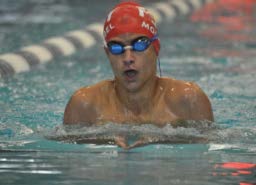Advocacy in the community is a very important skill and one that takes time and preparation to develop, whether you are the parent of a child with a disability or an individual with a disability.
BY PAMELA AASEN
Both of my children have Usher syndrome type 1; they were born deaf, are progressively losing their vision and have severe balance issues. In the beginning my husband and I learned to advocate as their parents, but as they got older, we recognized the need to prepare our children to advocate for themselves. It was a process, and one we developed along the way.
Ethan and Gavin are 17 and 15 years old now. They participate in their IEP meetings, advocate for themselves with their teachers, and regularly present at schools, universities and charitable events to speak about their experiences and raise awareness about Usher syndrome. They are Student Ambassadors for Ava's Voice, an organization dedicated to empowering youth with Usher syndrome and to educate families and school communities. As my husband and I begin to take the backseat and watch them in action, we are reassured that they are confident young men who understand themselves and can communicate their needs.
In the beginning…
Our oldest son, Ethan, was born in 2001 in the Dominican Republic. My husband and I had been there for many years; with the beautiful weather, jobs we loved, and a relaxed lifestyle, we thought life could not be better. A child was a wonderful addition to our lives. However, my suspicions that Ethan had hearing loss began early. Of course, in the beginning, you want to believe you are mistaken in thinking there is a problem and hope to be proven wrong. My first lesson in advocating for my child was getting my husband on board. Thankfully, he was open and listened to my concerns. The next lesson was believing in ourselves as parents because it took a while to get the professionals to take us seriously. Finally, after months of frustration and worry, and knowing something was not right, we took Ethan to be evaluated in Florida when he was 10 months old. He was diagnosed as having a profound bilateral sensorineural hearing loss.
It was an emotional time, but Ethan was a baby, so it was up to us to advocate for him and make the decisions we thought were the best for our family. When we were presented with our options, we decided on cochlear implants. He was immediately fitted with hearing aids and we headed back to the Dominican Republic to prepare for his cochlear implant surgery in Miami at 13 months old.
Everything got much harder when we returned to the Dominican Republic. Being in a foreign country, we did not have any resources or support groups at our disposal. We diligently researched resources for children with hearing loss and cochlear implants. It was overwhelming and we quickly realized the next step in our advocacy journey was identifying our roles. My husband would take the research role while I would be responsible for implementing Ethan's appointment/therapy needs.
After Ethan's surgery, we made the decision to move our family to Canada. I'm Canadian and the access to universal healthcare made the most sense. We knew we had to do what was best for Ethan to maximize his speech and language development. In 2004, his brother Gavin was born in Toronto. Infant hearing screenings were available, so we found out at the hospital that he failed the screening. Given our experience with Ethan, making the decision and advocating for Gavin to get a cochlear implant was easy. Gavin was fitted with hearing aids as we started to prepare for his surgery at eight months old. It wasn't over yet though.
The next decision was immediately upon us as a second cochlear implant became an option. It wasn't automatic in 2005 like it is now with the research to support bilateral implants. There were certainly advantages to getting a second implant but were also told we should save an ear in case there was a "cure" one day. Again, we had our roles… as Ethan, Gavin and I attended audio-verbal therapy together, I talked to the professionals and my husband researched the benefits. We attended conferences and the family education days held by the Hospital for Sick Children. We again made the decision we thought was best and the boys received their second implants within six months of each other – Gavin at 18 months and Ethan at almost five years old.
We realized that part of being a good advocate for our children was doing the research and then being confident in the decisions made moving forward. We also knew it was important for our children to be around other kids like them so we joined organizations for the deaf and hard of hearing. We became volunteer advocates and shared our story, on panels and through presentations, with parents who were facing the same decisions.
Elementary School…
The next big part of advocating for our children was keeping them in the loop. We started at an early age, talking to them about being deaf and how their "ears" worked differently. We taught them how to change their own batteries and take care of their equipment. As soon as they started kindergarten, we had them talking to their classmates with help from their Teacher of the Deaf. They were asked to be on panels, talking to teachers about having a deaf or hard of hearing child in the classroom. They used it as a topic for speech contests in school. We strongly believed that talking to others would help them understand their differences while at the same time highlighting, for themselves and others, what made them special. Our goal was to build their confidence…and it worked. Some of their peers asked if they could have a cochlear implant!
During these early years, there were other concerns; as infants they couldn't hold up their heads, as babies they couldn't sit on their own, and as toddlers they couldn't walk. There was something off with their vision, too; they couldn't find things that were right in front of them and they had difficulty seeing at night. My husband and I noticed they were clumsy, they fell all the time, they couldn't walk on uneven ground and they couldn't seem to coordinate the movements of their body. We described them as floppy; their first "official" diagnosis was "lax ligaments". We felt there was more to it; it still didn't quite fit so we again we had to trust ourselves as their parents. While we continued to advo cate for a further diagnosis, we took them to occupational therapy and physiotherapy. Eventually, when Ethan was 7 and Gavin was 5, they were diagnosed with Usher syndrome type 1b.
I remember the feeling of relief with knowing that there was a known cause for their struggles and the devastation I felt with the diagnosis when I thought about their future. We certainly needed time to grieve but we also knew we needed to continue being their advocates and help them understand this new dimension. We talked to them about what having Usher syndrome meant; they would have to work harder at anything balance related and, like their ears, their eyes were also different, and they would need help at school.
They, in turn, continued speaking about their needs to classmates and teachers. We felt strongly that their diagnosis didn't define them, but if they could embrace their differences through public speaking, they wouldn't feel any shame with the accommodations they needed to level the playing field with their typical peers. So our efforts continued. Our family helped start a charity golf tournament to raise money for vision loss with the boys as the featured speakers. We spoke at special education classes at a local university. We nominated the professionals at the Hospital for Sick Children for a family-centered care award, and the boys presented the award to this group that was truly like our family. They even filmed an episode of a Canadian TV Show that raised awareness by showing a day in the life of children facing challenges.
Middle and High School…
In 2014, when the boys started middle school, we moved to New Jersey! Not only were they in the position of being in a new school and having to make new friends, they had to navigate a new country. This decision was not made lightly and, since they were on the path of advocating for themselves, we knew they needed to be a part of this major life decision that would take them away from all that was familiar. As their parents, we researched the schools, the health care, and made inquiries about the Usher syndrome community to provide all of us with the information we needed to make this decision. This is when we found the organization, Ava's Voice. We went for it and though it took time, our family adjusted and settled into our new lives. The boys had a level of confidence that helped them share their background with new teachers and peers. To boost that confidence, they participated in leadership activities like the Civil Air Patrol, and an annual leadership conference.
As the boys got older, we looked for opportunities to increase our advocacy at all levels. I got a job at the SPAN Parent Advocacy Network. We became active participants in Ava's Voice; the boys were part of student panels and spoke at schools, universities, workshops, conferences and charity events. At this time, it had evolved to be a family affair so when I had the opportunity to propose a presentation for the SPAN's Leadership Conference, we developed a presentation titled, "Advocating as a Family".
Along the way…
Throughout this time, though Ethan and Gavin were also attending doctor's appointments and therapy sessions, we knew that it couldn't all be about having Usher syndrome. There were family outings/trips to help them experience the world and build their vocabulary. We also wanted them to have visuals as their vision faded. And like any parent of a typical child, we put them in sports. They tried and loved them all… even if they weren't very good because of their balance problems. But they didn't give up. They worked hard on getting better, both by themselves and with their personal trainer. It paid off as they became athletes and developed a love for all sports; each eventually made travel baseball teams and currently are on their high school cross country and swim teams. They enjoyed swimming with their typical peers but commented that because of their fatigue level at the end of the day it was like they had practiced already for two hours and then had to have a two-hour practice with their typical peers.
When they lost more vision, we realized it was time to find a place where they could compete against other youth like them so they joined a Paralympic Club and participated in para events. For us, the idea was to have many avenues open to them when one closed. Maybe they can't play baseball anymore, but they could join cross country. Para sports increased those opportunities and gave them the chance to compete against other visually impaired athletes.
All of these activities helped Ethan and Gavin build their confidence and knowledge of the world, but the final piece of the advocacy puzzle was providing them with role models – successful adults with Usher syndrome. They have met an author/motivational speaker, and a Paralympic athlete, both of whom have Usher syndrome. They have met blind engineers, teachers, and other professionals to give them a glimpse into the future that is possible for them. Through Ava's Voice they have attended a camp for youth with Usher syndrome, giving them peers they can relate to. So, now as we prepare to send our oldest son off to college, we are confident we have given them the tools to be successful.•




GOOD SPORTS: LIke any parent of a typical child, we put them in sports. They tried and loved them all… even if they weren't very good because of their balance problems. They worked hard on getting better, both by themselves and with their personal trainer. It paid off as they became athletes and developed a love for all sports; each eventually made travel baseball teams and currently are on their high school cross country and swim teams.
ABOUT THE AUTHOR:
Pamela Aasen is the parent of two children with multiple disabilities, and serves as the Director of the EHDI (Early Hearing Detection & Intervention) Mentoring and Family Engagement Project at SPAN Parent Advocacy Network. For more information, see spanadvocacy.org/programs/ehdi
TOOLS FOR SUCCESS : ADVOCATING RESOURCES
AVA'S VOICE avasvoice.org
USHER SYNDROME COALITION usher-syndrome.org
HEARING LOSS INFORMATION FOR FAMILIES (includes contact for each state) CENTERS FOR DISEASE CONTROL & PREVENTION cdc.gov/ncbddd/hearingloss/families.html
USHER SYNDROME SOCIETY ushersyndromesociety.org
NATIONAL CENTER ON DEAF-BLINDNESS nationaldb.org
MARK'S MOMENTS TVO tvokids.com/school-age/videos/marks-moments/ethan-and-gavin